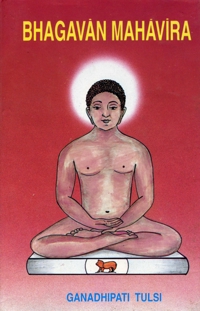 | Chapter 6 | Transvaluation |

ourteen thousand monks and thirty-six thousand nuns were initiated in the Order founded by Bhagavan Mahavira.
Lakhs of persons adopted the minor vows and became Sravakas (lay followers). The number of his followers, admirers and supporters was even larger than that and included many well-known personalities of that age.
Bhagavan Mahavira considered casteism as irrational and inegalitarian. Hence men and women belonging to all castes and communities were initiated by him. He had eleven apostles.
| # | Name | Gotra | Village | Disciples |
| 1. | Indrabhuti | Gautama | Gobaragaon | 500 |
| 2. | Agnibhuti | Gaulama | Gobaragaon | 500 |
| 3. | Vayubhuti | Gautama | Gobaragaon | 500 |
| 4. | Vyakta | Bharadwaja | Kollaga Sannivesa | 500 |
| 5. | Sudharma | Agnivaisyayana | Kollaga Sannivesa | 500 |
| 6. | Mandita | Vasistha | Maurya Sannivesa | 350 |
| 7. | Mauryaputra | Kasyapa | Maurya Sannivesa | 350 |
| 8. | Akampita | Gautama | Mishila | 300 |
| 9. | Achalabhrata | Harita | Kausala | 300 |
| 10. | Metarya | Kaundinya | Kausambi | 300 |
| 11. | Prabhasa | Kaundinya | Rajagrha | 300 |
All of them were Brahmanas. The original followers of those apostles were also Brahmanas.
Four thousand and four hundred monks initiated by Bhagavan Mahavira were Brahmanas.
This number includes only those who were initiated at the first instance. We do not know the exact number of the Brahmanas initiated later.
A large number of Ksatriyas had also been initiated. Many Ksatriya rulers like Dasarnabhadra, the ruler of Dasarnapura (Vidisa), Udrayana, the ruler of Sindhu Sauvira, Siva, the ruler of Hastinapur etc. entered the Order of Bhagavan Mahavira. Mrgavati, the queen of Satanika, ruler of Kausambi and several queens of the Emperor Srenika of Magadha became nuns and joined the Order.
Dhanna, Salibhadra, Anathi etc. belonging to the Vaisya community and Sudras like Arjunamali were also admitted to the monastic Order of Bhagavan Mahavira. The Order was open to all castes.
When the admission to the Order was open to all castes, how could it not have been open to all classes also? It admitted the kings as well as the labourers. Bhagavan Mahavira initiated them all in the principle of equality and infused them with the egalitarian spirit.
Sometimes, however, the past impressions of casteism and class-consciousness raised their ugly heads in some monks and nuns, and they were disturbed by the conceit generated by them. In that eventuality Bhagavan Mahavira won them over to equality. Once faced with such a situation he addressed the monks and nuns:
| Sutrakrtanga, 1/13/8: annam janam passati bimbabhuyam. |
"I have propounded the principle of equality. You have accepted its discipline. The pride of caste, family and status creates inegalitarian attitude. You have renounced false pride and have adopted affability. You have abandoned inequality and choosen the attitude of equality. Is it befitting for you to revive the odd forsaken attitude? Try to comprehend that man intoxicated with egotism treats others as if they were mere shadows.
| Ibid, 1/2/2/2: jo paribhavai param janam, samsare parivattai maham. |
He insults others. One who adopts an insulting attitude towards others gets lost into the world of adversities..
| Ibid, 1/13/10: je mahane khattiya jayae va, tahuggaputte taha lecchai va / je pavvaie paradattabhoi, gottena je thabbhai manabaddhe // |
It is true that you have been born in the caste or family of Ugras or Licchavis. But now you have been initiated into an Order based on equality. You have adopted ahimsa and live on the alms offered by others. Then why do you feel puffed up?
| Ibid. 1/13/11: na tassa jai va kulam va tanam, nannattha vijjacaranam succinnam. |
The caste and family cannot provide you any protection. It is only learning and religious conduct that can do so.
| Ibid. 1/13/16: te savvagottavagaya mahesi, uccam agottam ca gatim vayamti. |
Hence do not take pride in your caste, family and grandeur. You have transcended the limitations of all clan-denominations. You are seekers after emancipation, which is free from clan-denominations. Only by renouncing the sense of clan-denominations, can you attain that state.
| Sutrakrtanga, 1/2/2/3: je yavi anayage siya, je vi ya pesagapesage siya / je monapayam uvatthie, no lajje samayam samacare // |
Earlier some of you might have been king, and others servants of kings, or the servant of servants. But once you have been initiated into the egalitarian discipline, the distinction between a king and a servant has disappeared. Hence you all should behave in an egalitarian spirit."
This exhortation of Bhagavan Mahavira imbued with egalitarianism swayed the Order. On being instructed in the egalitarian discipline, monks and nuns hailing from different countries and brought up in different environments fostered brotherhood. The spirit of equality created by Bhagavan Mahavira in that age of inequality is still the greatest inspiration for the present age also.
Bhagavan Mahavira realised the Truth and expounded some principles based on it for the good of the world. People gave him a patient hearing and followed the path shown by him.
| But no new ideology is acceptable to society all at once. It has to pass through phases of development and consolidation for a long time before it gains wide acceptance.
|
In the context of spirituality, Bhagavan Mahavira said,
| "It is better for me |
 Acharya Tulsi
Acharya Tulsi

